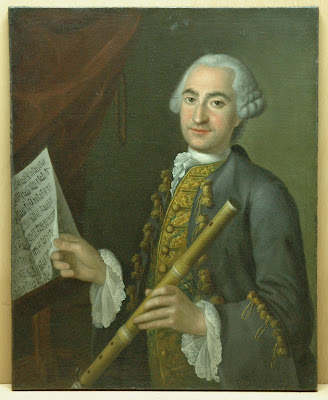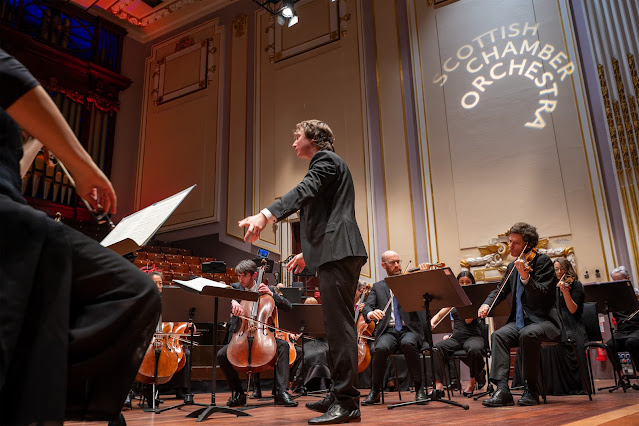 |
| Pierre-Gabriel Buffardin Principal flautist in the Hofkappelle in Dresden |
Bach: Cantatas BWV94, BWV114, BWV8, Buffardin: Flute Concerto in E minor; Hilary Cronin, Clint van der Linde, Charles Daniels, Edward Grint, Rachel Brown, London Handel Players, Adrian Butterfield; Wigmore Hall
Reviewed 1 October 2024
Focusing on a group of cantatas Bach wrote with virtuoso flute parts, London Handel Players craft an esoteric but fascinating programme
When Bach arrived in Leipzig in 1723 he embarked on an ambitious cycle of weekly cantatas for the church’s year, each geared to that day’s readings. Whilst he did use flutes, he did not make significant use of the transverse flute but from mid-August to mid-November 1724 he produced a weekly cantata that included a significant, challenging flute part. We don’t know who the flautist was, but clearly Bach had access to a player of some considerable talent and commentators speculate that one of the flautists from the Dresden court must have travelled to Leipzig and the most likely candidate is the French flautist, Pierre-Gabriel Buffardin.
This is the background to London Handel Players‘ slightly esoteric but fascinating programme at Wigmore Hall on Tuesday 1 October 2024. Directed from the violin by Adrian Butterfield and featuring flautist Rachel Brown, the ensemble performed three of Bach’s cantatas from this period, Was frag ich nach der Welt BWV94, Ach, lieben Christen, seid getrost BWV114 and Liebster Gott, wenn werd ich sterben BWV8 plus Buffardin’s Flute Concerto in E minor, one of his few surviving works. The soloists were soprano Hilary Cronin, alto Clint van der Linde, tenor Charles Daniels and bass Edward Grint.
The result was a programme that shed an intriguing light on a particular period of Bach’s life, though the focus on a particular part of the church’s year meant that we had three rather intense cantatas on weighty subjects. And these are substantial pieces, the first half of the concert, which included BWV94 and BWV114 lasted around an hour.
It wasn’t just the flute parts that intrigued, structurally Bach seemed to be experimenting too, varying his approaches and I was particularly intrigued by the way, in BWV94 he combined recitative and choral in one movement utilising just a single soloist, the lines from the chorale punctuating the recitative. And in other areas, Bach seemed to be experimenting and varying the way the rhetoric of the arias worked. There were moments that reminded you of later Bach arias, partly because the rhetorical solutions were ones that he returned to. Bach’s production of weekly cantatas can sometimes seem to be something of a foot-slogging marathon, but we have to remember that they gave the composer an almost endless sequence of strong texts in which to try different solutions to engaging his audience and making them think about the meaning behind the text and the music.
We began with Was frag ich nach der Welt BWV94, (Why enquire after the word) whose opening chorus paired a rather perky instrumental texture including a busy flute part (Rachel Brown) with a rather direct four-part choral underneath. The first aria, ‘The world resembles smoke and shadow’, was sung in wonderfully communicative manner by Edward Grint and featured a striking vocal line paired with a fabulously busy obbligato cello (Sarah McMahon). Then came the first recitative and chorale, sung by Charles Daniels and featuring two intertwining oboes d’amore (Andreas Helm, Joel Raymond). Clearly an experiment but a fascinating one. Clint van der Linde’s arias ‘Deluded world!’ featured the obbligato flute, an elegantly wandering, graceful flute pairing with the rather affecting, chromatic vocal line. A second recitative and chorale, sung this time by Edward Gring was followed by a pair of arias. ‘The world cannot exalt its delight and joy’ was sung in lyrical yet busily virtuoso fashion by Charles Daniels, then Hilary Cronin was joined by an oboe obbligato (Andreas Helm) for the expressive yet very busy ‘He siss with a blind world’. The concluding choral was performed by everyone, strong and direct.
Ach, lieben Christen, seid getrost BWV114 (Ah, dear Christians, be comforted) was perhaps less adventurous but no less striking and featured a horn in the ensemble, though the instrument was never asked to do anything particularly bravura. The opening chorus paired strikingly vigorous instrumentals with a chorale in the soprano accompanied by three other busier vocal lines. The tenor aria, ‘Where within this vale of sorrow’ featured the flute obbligato, and this was slow and affecting but with quite a busy flute part. Rachel Brown’s programme note assigned metaphorical meaning to the flute writing in these arias, Bach combining challenge for the player with meaning for the listener. Edward Grint made the following recitative full of meaning, whilst the chorale featured Hilary Cronin’s singing a rather direct chorale melody against a vividly busy cello and harpsichord (Silas Wollston) accompaniment. In the aria ‘No longer, Death, shall you make me afraid’, Clint van der Linde’s plangent tone was complimented by a busy oboe solo, and the whole went with a surprising swing. We ended with another, rather direct chorale sung by tutti.
After the interval we heard Buffardin’s Flute Concerto in E minor. Buffardin was principal flautist in the Hofkappelle in Dresden from 1715 to 1749 where he taught Quantz and Johann Sebastian Bach’s elder brother, Johann Jacob Bach, whom he met in Constantinople in 1711. His concerto is one of the few surviving work that can be confidently attributed to him. Buffardin was evidently renowned for playing fast notes, and there were plenty of those in the concerto. The first movement was perkily busy but the most striking sections were those where Rachel Brown’s virtuoso flute was accompanied just by the two violins (Adrian Butterfield, Oliver Webber), creating something miraculously weightless. The middle movement was engagingly flowing, whilst the finale returned to incredibly fast notes and weightless moments.
We ended with Bach’s cantata Liebster Gott, wenn werd ich sterben BWV8 (Dearest God, when shall I die) where Bach takes the flute up to the very top of its range and perhaps beyond; the original flute part is crossed out and later Bach transposed the entire cantata down a tone!
The opening chorus was in a graceful triple time with a burbling flute over, then Charles Daniels sang the aria ‘Why, my spirit, would you be fearful’, with a busily flowing oboe d’amore as duet partner. Daniels as long experience in this music and he is always rewarding to listen to, but there were moments during the evening when I felt that his pointing up of words and rhetoric veered a bit towards the mannered. An intense accompanied recitative for Clint van der Linde followed, with a final aria ‘But vanish, you foolish, vain worries!’ for Edward Grint with a flute solo. This aria ensured we ended on a more upbeat note, it was engagingly swaggering with Grint giving a delightful rendering of the busy vocal line paired with Rachel Brown’s extensive and nicely perky flute obbligato. After more recitative for Hilary Cronin, we ended with a vigorous chorale from everyone.
The blog is free, but I’d be delighted if you were to show your appreciation by buying me a coffee.
Elsewhere on this blog
- A special treat: strong individual performances & superb ensemble in WNO’s revival of Puccini’s Il trittico – opera review
- Embodied sound: Zubin Kanga on his innovative approach to new technology through his interdisciplinary musical programmes – interview
- Compelling performances: Stephen Hough, YL Male Voice Choir, Santtu-Matias Rouvali and the Philharmonia – concert review
- Investing in the magic of Purcell’s music: The Fairy Queen from The Sixteen at Cadogan Hall – opera review
- High-quality music-making & imaginative programming in the special natural setting of Exmoor & Dartmoor: I chat to Tamsin Waley-Cohen of the Two Moors Festival – interview
- A superb sense of community: Mascagni’s Cavalleria Rusticana at Blackheath Halls Opera – opera review
- Remembrance and renewal: Peter Seabourne’s My Song in October – record review
- Both audience & player go on a journey together: Latvian pianist Reinis Zariņš discusses Messiaen’s Vingt Regards which he performs at the London Piano Festival – interview
- Celebrating Jommelli in style: Ian Page & The Mozartists make a compelling case for this neglected music – concert review
- Fire and water in the library: Siren Duo in an imaginative flute and harp recital for Temple Music – concert review
- Home










